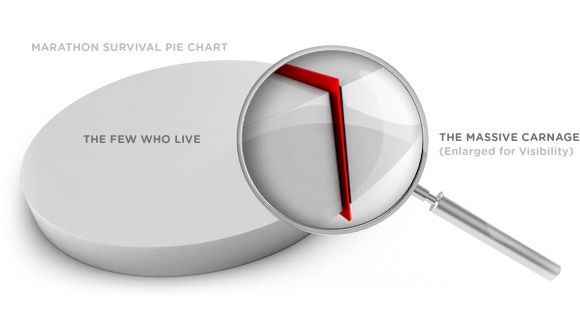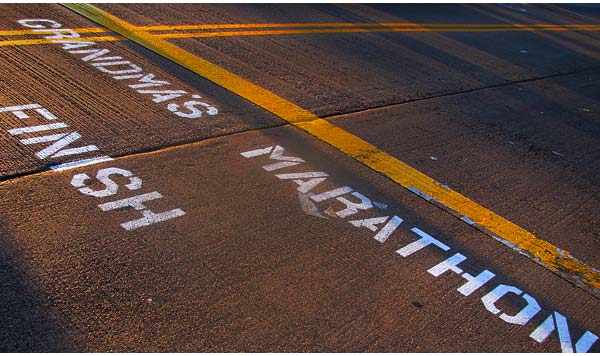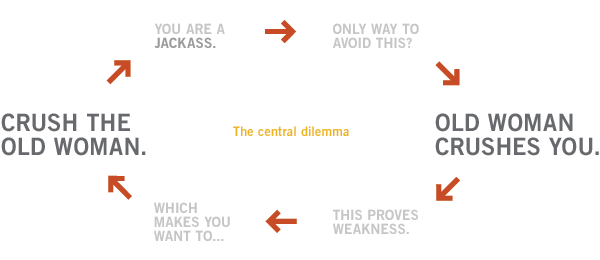OUTRAGE! Only 99.9992% of Marathon Participants Live to Run Another Day! 07Dec09

Winston Smith, gangly father of three, staggered across the finish line, his breath coming in wisps of labored wheezing. Streaked with grotesque rivulets of dried salt, he struck an image of one who had endured terrible hardship and emerged decidedly worse for the wear. Smith had just miraculously survived the 2009 New York City Marathon.
He was one of the lucky ones.
Death by Marathon
The marathon is a relentless killer, extinguishing the lives of spirited weekend warriors at an ever-alarming rate. Runners expect to achieve glory. Instead, legions meet their sudden demise on the course.
The numbers are sobering. With the savage appetite of a celestial black hole, the marathon devours nearly eight millionths of all participants, a figure containing plenty of zeros. Specifically, .000008 of all marathoners die during this grisly race.
Such exceptionally high numbers give mathematicians pause. According to one concerned set theorist, “It doesn’t take Pythagoras to see that average deaths have reached the 6th significant figure to the right of the decimal. I’m no alarmist, but I calculate the chances of death during the marathon as dangerously far above zero, infinitesimally speaking.â€
As shocking as these numbers are, they merely reflect races held in the United States. Worldwide fatalities are surely much higher. Details are sketchy. We literally have no idea how many marathoners have joined the choir invisible under Moldova’s Vladimir Voronin or Sri Lanka’s Mahinda Rajapaksa. We may never know.
One thing is certain, ever more naïve, casual athletes attempt the marathon each year. In 2008, an estimated 425,000 runners (in the U.S. alone) made the fateful decision to entrust their lives to the cold embrace of statistics. In 2009, 465,000 people tempted the grim reaper. If these stunning numbers continue to spiral, the marathon may become one of the deadliest activities known to man, rivaling only encounters with a cow, falling down, and daring to exist during the month of January for sheer morbid lethality.
Fortunately, most runners fall prey to debilitating injuries that prevent them from running the marathon in the first place.
Smith’s Feat Warrants Investigation
The extraordinary Winston Smith somehow avoided injuries, survived training and astonishingly escaped the 2009 New York City Marathon with his life. Were other runners as mysteriously fortunate? How many died in their quest to scratch an item off of the definitive bourgeoisie bucket list?
Available records indicate that, inexplicably, of the 43,741 people who ran the five-borough death trap, precisely none died.
This improbable wellspring of life can only be attributed to gross error, statistical oddity or, more ominously, sinister cover-up. For the sake of all involved, the startling lack of fatality in New York must be investigated immediately.
Given the overwhelming odds against living through the marathon, how could Smith have possibly lived to tell his tale? Does he even exist? What did race officials know, and when did they know it?
The public demand answers.
– Dean
A WORD ON THE NUMBERS
Running USA provides and excellent look at marathon participation statistics.
The most often quoted study for marathon fatalities (Redelmeier and Greenwald – BMJ 2007) concluded that on average, .8 marathoners per 100,000 die during the race. This is apparently the most recent, detailed and oft-quoted study related to marathon mortality. It forms the basis for the figures in this post.
Some feel that 1 of every 50,000 participants die during the marathon. Even if this lower figure is entirely correct, just .00002 of all runners die during the marathon. This is a very low number.
However, neither figure is so low that it escapes the eyes of sensationalists.
SPECIAL THANKS
Thanks to The Bigger Design for the lovely Pie Chart, and to Mr. Davidson for mathematical fact-checking.


 Indirectly relevant photo by
Indirectly relevant photo by 